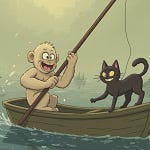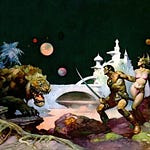Welcome to the premiere episode of my new audio series: The Podcast Was Never Found.1
As some of you know, I’m not entirely new to this format. I never thought I’d ever appear on a podcast, let alone help to found one. For most of my adult life I’ve been a lone wolf and shadow lurker, by temperament and training. What a difference a few years of worldwide totalitarian murder and mayhem makes!

However, since forming our T7 Voltron is tough to schedule on a regular basis, I decided to try my hand at this moonlighting gig. My plan is to talk to individual writers, thinkers, seers and doers from our fertile Substack samizdat scene.
And what a wild scene that’s become! A whole menagerie of gonzo journalists, heterodox historians, avant-garde traditionalists, RETVRN Futurists, interstellar Vikings, Olympic rabbit hole divers, cybergnostic psychonauts, erudite gay werewolves, and a slew of other exotic breeds and mutations that make the Island of Dr. Moreau look like Coconut Bay.
With that in mind, what better weirdo to kick things off than
of ? Philosopher, metaphysician, historical detective, and rock-and-roll raconteur (seriously), he is one of those gifted minds I never expected to encounter in my lifetime, let alone come to think of as a colleague and friend.In both writing and conversation, Luc strikes me as an almost impossibly agile mutant: a philosophical spiderman who can snatch up and bind together the finest threads from every age, coordinate and style of published thought, then refashion them into something utterly unique and elegantly persuasive.
But that word — “elegantly” — is deceptive in Luc’s case. It’s not the elegance of a ballerino gamboling across a stage, but that of a finely honed and trained boxer, calmly closing in for the kill. Having witnessed some of these knockout punches firsthand, I can attest to the man’s absolute savagery when he uncorks them.
And as scholarly as his mannerisms and references can be, I think it’s Luc’s use of common English terms that electrifies his most shocking blows. For example, in all my life I’ve never heard a man use the words “silly” or “bonkers” or “crazy” quite the way he does. Whether written or spoken, he somehow imbues these blunted words with an extra layer of meaning that you can feel down in your guts and blood. You just know this polyglot sonofabitch picked out the best possible word, and from your own native tongue. You’re convinced the thing he’s describing is — inarguably. unmistakably — stupid, silly, or crazy, and deserves no further poetry to describe it:
(from Koch’s A Cry From the Wilderness)
Everybody is eaten alive by their identifications, their emotional attachments. Step back for a moment: it is plain silly.
There is only light and darkness. The rest is stupid.
For God’s sake, stop complaining & whining & plotting like a village gossip.
Whatever happened to just having a beer with the guys.
You can shove your theories, your rules, and your revenge fantasies somewhere else. Seriously.
The dome of doom must be broken by love. Your darkness ain’t pretty. That’s a fact.
If you can’t recognize and discern the darkness in everything, and the light in everything, you are toast.
Other times, he pushes us to peer more deeply into history than is comfortable. Many of those demon wraiths that haunt our schoolboy textbooks might retain their ugliness, perhaps, but the adult versions of these texts are far more nuanced, and tend to unveil the ugly sins and crimes of their so-called “heroes” too.
For Luc, a proper study of history isn’t the pursuit of endless revision — or even the ridiculous inversion of the propagandist’s fable, tempting every crank, schizo and grifter to join in on “the fun.” It’s a process of that requires us to not just compile and analzye the raw data, but to model the minds of the people who shaped those events in a dispassionate way. The goal isn’t to “own” or “control” the past, but to convert its flattened cartoon into something altogether more graspable and sensible. More useful too, if we are to learn our lessons and break the vicious cycle.
(from Hitler: The Ultimate Rorshach Test)
(Guido Giacomo) Preparata’s version of events reads a bit too much like yet another neat little narrative, and some of his claims are far-fetched indeed. But still, it would be foolish not to assume that strong factions in Britain and the US, as the dominant world powers, didn’t pursue their interests with Machiavellian zeal, and that a lot of the moralistic story we’ve been told is incomplete at best, utter nonsense at worst.
For instance, it makes total sense, from this perspective, that Britain’s support for the Russian Whites (who fought against the Bolsheviks) was just for show, and that it covertly undermined the effort. Why wouldn’t it, if a destroyed Russia led by murderous zealots was preferable? And why wouldn’t certain factions in Britain, looking at the different options in Weimar, covertly support Hitlerism rather than the forces hostile towards England? And isn’t it true that powerful forces, including Churchill, saw to it that England entered WWI by fearmongering about an exaggerated threat of German fleet-building6, needlessly turning it into a bloodbath dragging on for years, masterminded Versailles using deception and scheming, and then did it all over again when it entered WWII, promising Poland security out of the blue without demanding anything in return, even while it led Hitler to believe it would stay neutral?
Indeed, if you forget about all the propagandistic smoke screens for a moment, between Anglo geopolitical interests and the Military Industrial Financial Complex getting fat on war by lending and selling to all sides, early 20th century history starts making a lot more sense.
Indeed it does. And it also tends to sound an alarm, and activate the hidden circuity of people and institutions that profit most from keeping the story nice and simple.
For example, consider the ongoing, international firestorm that erupted from Tucker Carlson’s recent interview of historian
, and the more general topic of genuine historicity versus the sacred mythologies we’ve been programmed since birth to mindlessly regurgitate and defend. To question the central myths of World War II is, in a sense, to shake the fulcrum of consensual reality. Those who do so enter not just a boxing ring, but a tiger’s cage strewn with booby traps, and guarded by a thousand red-dot snipers hidden in the tall grass.To which, Luc answers: Game on.
As with Cooper’s own work, the latter masterpiece is sure to break noses, crush jaws, and crack ribs of readers who’ve convinced themselves they “know history” in any useful way. And, yes, this includes many regime dissidents, who aren’t even aware of the kinds of sacralized myths that haunt their imaginations. Luc and other brave writers shine a painful light on our ignorance, because they know we all desperately need to understand how we came to this dangerous moment (and at depths our enemies will never dare to plumb).
Then, in the aftermath of all his sneaky maneuvers and thunderous blows, there comes a putting-back-together of things. You could call this part of Luc’s trade a kind of healing, or scar tissue, or muscular growth. In some way, these all describe the same phenomenon.
But growth, most of all. For those who are ready, and who have eyes to see.
To kick things off, we discussed a recent article of mine which has (somewhat shockingly) become my most popular of all-time.
Enjoy.
And, of course, subscribe to LucTalks on Substack (and here on X… if you’re into that sort of thing).
P.S. Bring bandages.
The Cat Was Never Found is a reader-supported blog. I don’t publish much paywalled content, so your generous patronage is very much appreciated. As a reminder, a paid subscription will also grant you access to Deimos Station; the happiest place in cyberspace!
P.S. If you found any of this valuable (and can spare any change), consider dropping a tip in the cup for ya boy. It will also grant you access to my “Posts” section on the donation site, which includes some special paywalled Substack content. Thanks in advance.












